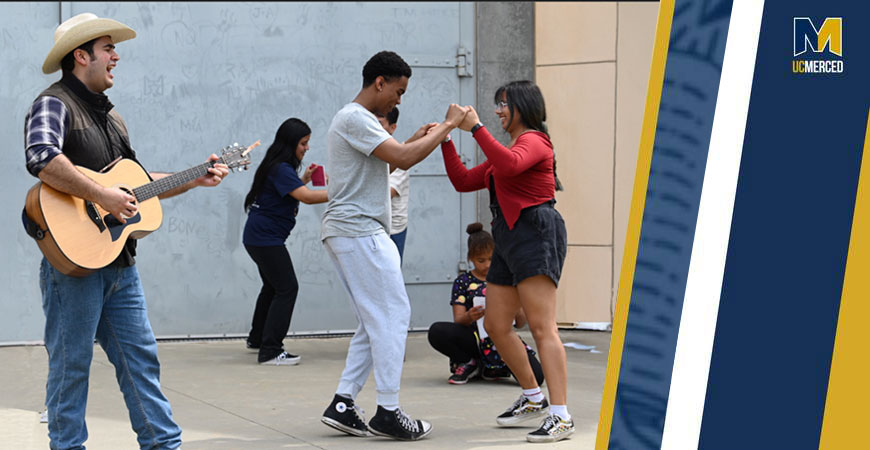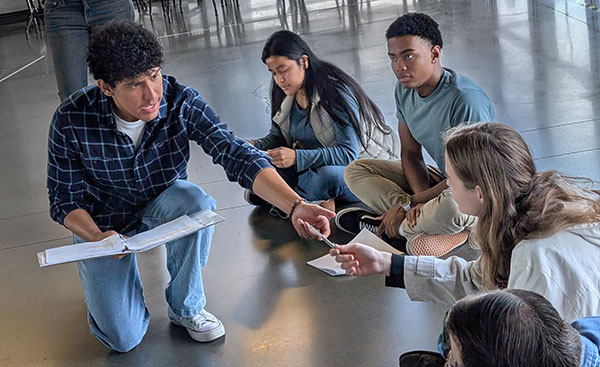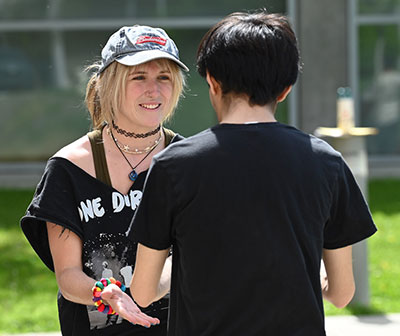
If Arden, the sprawling, wild forest in William Shakespeare’s “As You Like It,” were in the United States instead of the Bard’s imagination, it would certainly be a national park.
Like Yosemite.
That is why this light comedy is an ideal fit for the annual UC Merced theater project that weaves modern issues of environmental stewardship into the 16th-century playwright’s words.
“As Yosemite Likes It” is the eighth edition of Shakespeare in Yosemite. Like its predecessors, it features performers and backstage talent from the Merced and park communities and is packed with toe-tapping music, including three original songs.
But it is Shakespeare’s storyline, in which characters come to the forest of Arden from a corrupt city and experience the transformative power of nature, that makes it ideal for theater and literature Professor Katie Brokaw’s themes of appreciating and protecting the ecosystem.

“This play is perfect for Shakespeare in Yosemite,” said Brokaw, who co-founded the project, writes the scripts and directs the productions. “It’s fundamentally about people going into the woods and finding love and a better version of themselves.”
Each year, Shakespeare in Yosemite is scheduled near Earth Day (April 22 this year) and Shakespeare’s birthday (widely accepted as April 23). “As Yosemite Likes It” will have five performances, all with no admission charge:
-
6 p.m. Thursday, April 24, Wallace-Dutra Amphitheatre, UC Merced (in front of Little Lake)
-
Four shows at the outdoor amphitheater in Yosemite’s Curry Village (next to Seven Tents dining pavilion and The Mountain Shop): 5 p.m. Friday, April 25; noon and 5 p.m. on Saturday, April 26; and noon Sunday, April 27.
-
Consider taking public transportation to the park for performances.
“We have such a talented group, on stage and off. Everybody is having the time of their life,” said Joey Serrano, a UC Merced student who plays Orlando, a belittled younger brother who flees to Arden.
Serrano, a second-year global arts and writing major, is a theater kid through and through. He figured this is his 35th production, give or take, starting when he was 5.

“When I was younger, my friends and I would run around the neighborhood pretending to be heroes or pirates,” Serrano said. “When I found I could do that in front of an audience, well, that was awesome.”
Joanna Lopez, a second-year biology major from San Francisco, plays a scientist who studies the park’s ecosystems. “I think the play is our way of talking about the natural world,” she said.
The original “As You Like It” has a handful of tunes that have been performed traditionally or adapted to contemporary styles over the centuries. Tonatiuh Newbold, a pianist at Yosemite’s Ahwahnee Hotel, composed three original songs he performs onstage with a band.
Displacement is a powerful theme in the original script. Characters are exiled, forced out or stripped of their identities. Amid the natural beauty of Arden they experience insight, renewal and love.
“The idea of removing someone from their normal environment and what can happen when you do, Shakespeare has a lot to say about that,” Newbold said. “So the lyrics were very easy for me to write.”
We have such a talented group, on stage and off. Everybody is having the time of their life.
Sedney Suarez Gordon has worked alongside Brokaw as associate director, helping cast members develop their characters and generally working to keep things moving along.
“There’s a lot of encouragement and finding things that translate well for their parts,” he said.
Suarez Gordon, a graduate student in interdisciplinary humanities, comes from San Andrés, a Colombian island in the Caribbean. Its 26-square-kilometer footprint equals the size of the city of Alameda. He said Caribbean literary traditions are embedded in Shakespeare, particularly in “The Tempest,” a drama set on an enchanted island.
“One of the roles of the arts is to address our relationship to nature,” Suarez Gordon said. “Shakespeare in Yosemite explores that very well, in terms of what humans can do to affect that relationship, along with what we have not done.”




 Public Information Officer
Public Information Officer

